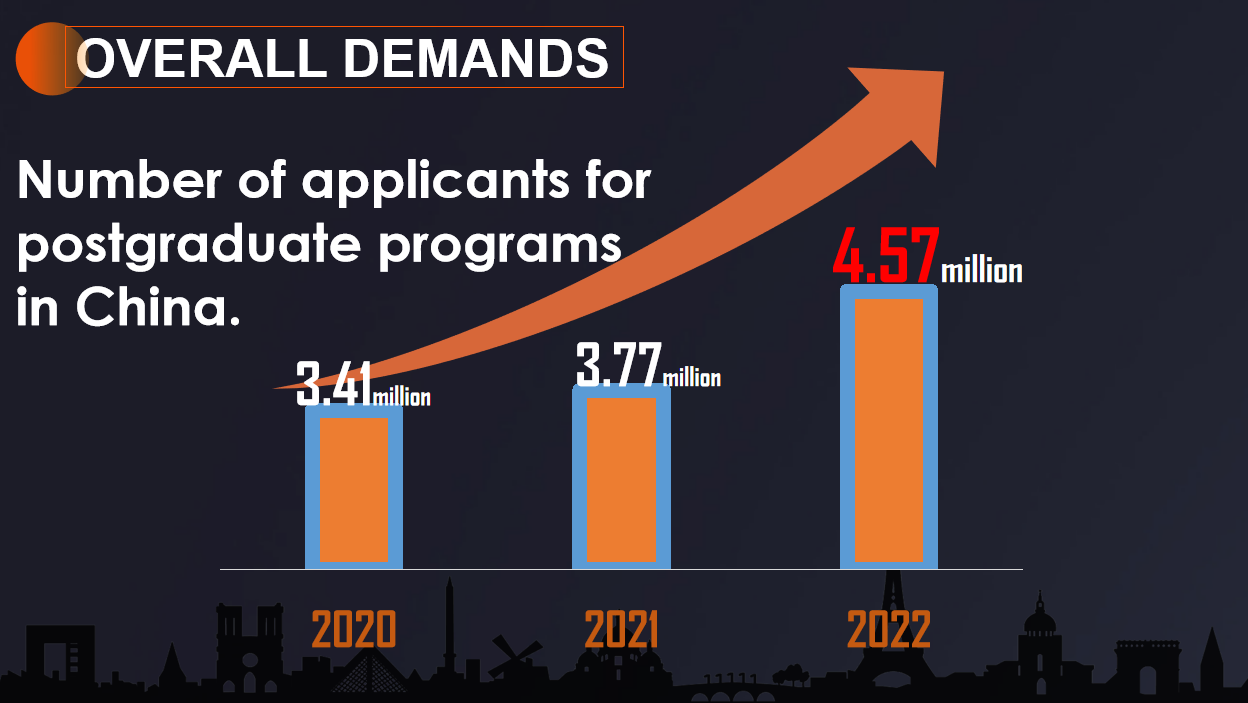Student Success - How can we better prepare the students for the global challenges?
China, one of the fastest-growing economies in the 21st century, is becoming more and more integrated into the world.
Nearly in every industry, unprecedented demand for international-class top-notch management talents is soaring. According to the Chinese Ministry of Education, each year, over 3.7 million people apply for postgraduate studies at Chinese universities.
In the Year 2022, the figure rose to 4.57 million, that’s an 800,000 increase over 2021. Yet, a projected low overall acceptance rate of 24.3% means that more than 3.4 million people will be rejected by the graduate school they apply to in the year 2022 alone.

The reasons behind the above mentioned phenomenon lies in the views and attitudes towards postgraduate entrance exams, known as "考研" in China. And such views and attitudes differ between university graduates in China and the United States. These differences can be attributed to various factors such as educational systems, cultural backgrounds, and employment environments.
In China, taking the postgraduate entrance exams is commonly seen as a pathway for further education. Many Chinese graduates view it as an important means to enhance their academic qualifications and job competitiveness. Here are some perspectives and attitudes towards postgraduate entrance exams among Chinese university graduates:
1. Enhancing academic qualifications and job competitiveness: Many Chinese graduates choose to take the exams to improve their academic qualifications and job competitiveness. The job market in China is highly competitive, and a postgraduate degree is often considered a better guarantee for employment.
2. Pursuing academic research and advanced opportunities: Some graduates are positive about postgraduate entrance exams as they see it as an opportunity to pursue academic research or higher positions. They hope to enhance their professional knowledge and research abilities through pursuing a postgraduate degree.
3. Social pressure and family expectations: In China, some graduates may feel compelled to take the exams due to societal and family expectations. The pressure comes from the recognition and value placed on postgraduate degrees by family members, relatives, and society.
In contrast, in the United States, attitudes towards postgraduate entrance exams may differ:
1. Employment and career development: In the United States, graduates prioritize employment and career development. They generally believe that gaining work experience and practical skills are more important than further education. As a result, fewer graduates choose to pursue postgraduate studies.
2. Career-oriented graduate education: In the United States, pursuing a postgraduate degree is often associated with specific career goals. Most students who choose to pursue postgraduate studies do so to specialize in a particular field, aiming for better opportunities and salaries in their professional careers.
3. Financial burden and debt: Pursuing a postgraduate degree in the United States often involves high tuition fees and living expenses. Therefore, some graduates may consider these financial factors and choose direct employment or seek other career development opportunities to avoid increasing their debt burden.
In short, there are differences in the views and attitudes towards postgraduate entrance exams among university graduates in China and the United States, influenced by various factors such as educational systems, cultural backgrounds, and employment environments.
Securing a better job and having a higher platform are essential for Chinese students to start thinking about the opportunities and challenges in today’s global society.
In order to foster the inclusive learning environment to help them gain the knowledge and skill to succeed in today’s global society, students from the U.S and China may face different challenges.
As Chinese economy is steadily on the rise, the living standard and living quality of Chinese people on the average are getting greatly improved. In the meanwhile, equity and completion in education can be well ensured with lifelong learning concept deeply instilled in people’s minds. Apparently, there are still other ways for Chinese students who have not passed the graduate entrance exam to pursue a master's degree.
1. Self-funded study abroad: One option is to study abroad for a master's degree through self-funding. Many foreign universities offer graduate programs that are open to international students and have different admission requirements and application procedures. By applying to study abroad, students can choose a master's program that suits their needs and obtain a foreign degree. In 2020, despite being during the pandemic, the number of Chinese students studying abroad reached 450,900. By 2022, this figure had risen to 662,100, representing an increase of 47%.
2. To consider professional degrees: In addition to academic master's degrees, there are also professional master's degrees available for selection. These degrees are typically related to specific professional fields and place more emphasis on practical skills and career development. By applying for a professional degree, students can further their studies in a specific field and enhance their employability.
3. To choose part-time degree program (including international degree programs): Another viable option is to choose an international part-time degree program. These programs are typically designed for professionals who already have some work experience and allow students to continue their studies while working. They often have flexible schedules and course offerings to cater to the needs of working students. According to the statistics, in 2022, the number of part-time postgraduate students was 4.57 million, which increased by 800,000 compared with 2021, with a growth rate of 21%.
To prepare the students for the future global challenges, different cultural contexts and national conditions have to be taken into account. Obviously, the U.S and China will take different approaches. But the equity and completion in lifelong learning must be guaranteed in both nations.

 AACSB
AACSB ICDE
ICDE ACE会员
ACE会员 粤公网安备 44030502005513号
粤公网安备 44030502005513号